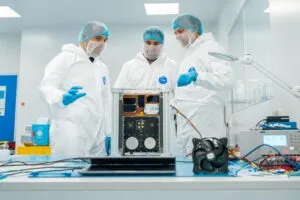The aim is to enable the experimental validation of new communication technologies in a real space environment.
It is due to launch at the end of Q4 year and will be operational for research purposes in early 2026. It will facilitate the the evaluation of 6G communication frequencies using multi-frequency devices, and the satellite will incorporate an optical terminal to enhance satellite-to-ground communications.
The company describes it as an “open and flexible testbed” that will allow the remote deployment and execution of experiments.
i2CAT
The project lead is i2CAT, a Barcelona-based research and design centre focusing on advanced digital technologies, such as 6G.
Open Cosmos writes:
“The 6GStarLab, a pioneering project led by i2CAT, will focus on the research and development of non-terrestrial networks (NTN) and enable the experimental validation of new communication technologies in a real space environment. It is the first satellite of its kind to be promoted across Europe. It will be an open and flexible testbed that will allow the remote deployment and execution of experiments, fostering innovation in an emerging ecosystem that works towards interconnection between terrestrial and non-terrestrial networks.”
i2CAT previously awarded a €1.65 million public contract to Open Cosmos. The award covers the design, manufacture, integration, launch and commissioning of the 6GStarLab satellite.
“This initiative perfectly exemplifies how collaboration between companies, research centres, and institutions can accelerate 6G development, bringing space technology to the core of advanced and secure communications on Earth,” previously said Rafel Jordà Siquer, CEO of Open Cosmos, when the mission was first announced.
The satellite will include payloads designed by i2CAT and the Catalan company Microwave Sensors and Electronics (MWSE), developed through the 6GSatNet project, a space-to-ground optical communication laser terminal and a ground station by Transcelestial, a Singapore-based company.
The manufacture of the satellite is currently taking place in the Open Cosmos clean room in its Barcelona offices. The Minister of the Presidency of the Government of Catalonia and President of the Board of Trustees of the i2CAT Research Centre, Albert Dalmau, has recently visited the facilities to see the manufacturing progress.
The mission also envisages a ground segment in Móra la Nova, from where the 6GStarLab satellite experiments will be controlled. It will facilitate research into optical space communications.
EU
The project is part of the programme for the Universalisation of Digital Infrastructures for Cohesion UNICO I+D 6G. This is promoted by the Spanish Government within its Recovery, Transformation and Resilience Plan, and is financed with NextGenerationEU funds.
In total, i2CAT has obtained €10 million from the subprogramme for the deployment of various research infrastructures.
Dating from 2015, Open Cosmos has facilities in the UK, Spain, Greece and Portugal. Its CEO and co-founder, Rafel Jorda Siquier, studied aerospace engineering at the Polytechnic University of Catalonia in Barcelona.
Image: Open Cosmos

